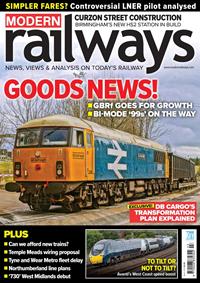|
|
A second Beeching?
Foulness—an opportunity
Bristol park-and-ride venture
Reconstituted LTE reports
Rail infrastructure grants not dead
Railway meetings discuss high speed
Letters
Eastern Region investment in Humberside freight growth
The capacity of single railway lines
Stockholm public transport integration
Rail flaw detection at speed
Westcode brake equipment for rapid transit
BSC suspension for two-axle wagons
SIG develops new passenger bogies for Swiss Federal Railways
The APT and the VTOL
A tourist railway works for its living
Train running and traction performance
Equipment
Westiloo for train toilet disposal
Western European electrification slow down
Diesel locomotive with three-phase transmission
(rter-city park-and-ride for Bristol
Protecting level crossings in the post-Hixon era
Accident report
Ore imports via Glasgow
Mew Books
Reshaping SNCF commercial organisation
Overseas
Industry
ON a great many counts Mr Richard Marsh surpasses one's most optimistic hopes of the kind of man this Government would select to succeed Sir Henry Johnson in the British Railways Board chair from September next (Mr Marsh has already joined the BRB, on May 3, as Joint Deputy Chairman). One of the ablest young Ministers bred in Harold Wilson's Labour Government, his disappearance from it was accountable only as the outcome of a personality clash.
Some commentators on the Marsh appointment have written down the value of a BRB Chairman with Ministerial experience. Granted, one can make too much of this, since the detail will still be discussed at lower BR and Ministry levels, but it could have substantial repercussions. The harsh fact is that railwaymen and civil servants still do not talk the same language on any floor. This is in no way a criticism of Sir Henry Johnson or a suggestion that personal relations are anything but cordial. Civil servants generally are artists in verbal intricacy, with years of training in self-expression. Railwaymen are not so adept with words, but free with their own science in more roughly turned phraseology that is vulnerable to charges of obscurantism and refusal to accept that anyone but railwaymen can know anything about railways. However, anyone who expects Mr Marsh to talk tough straight away on implementation in full of the 1968 Transport Act, the final stages of which he piloted through the Commons as Minister, might be dis-illusioned. With the Government's subsequent announcement that only about 80 per cent of the iron and steel industry and its ancillaries is likely to remain in British Steel Corporation hands, one respected transport writer's assertion that abandonment of hiving-off in the BRB's corporate domain was implicit in the Marsh appointment is even less credible. The Weaver-Glasgow electrification—over execution of which, ironically, he will now preside—had its roughest reception when he was Transport Minister. Unlike Barbara Castle, Richard Marsh had no inborn Labour sentiment for railways when he took over as Minister. At his first press conference, moreover, Mr Marsh laid much greater stress on the commercial side of his mandate than on development of the socially necessary passenger network. The scope and standards of the latter, he implied even if he did not quite spell it out explicitly, were for the Government and public authorities to decide. In other words, one came away suspecting that the economics of BR's "green field" freight activity was more likely to engage his attention than resistance to the gradual erosion of passenger service grant aid. It wasn't just his cigar that spread a whiff of Beeching. After all, is it likely that Mr Marsh, still in his early 40s, would have closed a political career of abundant potential and taken on the BRB under a Government dedicated to self-help unless commercial objectives dominated his thinking?
One thing is certain. As in the original Beeching era, BR will again become the cynosure of world railway interest—or, more properly, of attention among those who appoint the rail managements in other industrial countries. Across the Channel BR's lead in market-orientated re-organisation is gradually being followed. Richard Marsh is probably the prototype of tomorrow's hard-driving, "merit- ocrat" Western European rail president or chairman.



